Four months after his death, friends, former colleagues, ex-students and critics of the late Prof Bjorn Beckman are gathering to take another look at his scholarship and activism in relation to democracy in Nigeria. The memorial for the late scholar who passed on November 6th, 2019 is scheduled to take place March 12th, 2020.
Scheduled earlier on to hold at the more symbolically significant Paschal Bafyau Theatre at the Headquarters of the Nigeria Labour Congress, (NLC), the event has now been shifted to Nicon Luxury, also in Abuja. The venue shift may not be unconnected with the technical inadequacies of the NLC venue.
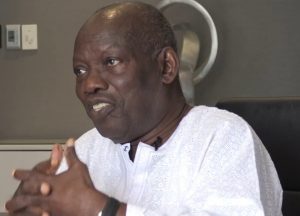
Prof Adele Junaid
Well located persons in Prof Beckman’s scholarship and activism have been selected to officiate and/or lead the discussions. Mallam Kabir Abdullahi Yusuf would be chairing the event. It is not clear if Prof Beckman taught Mallam Kabir who obtained a combined Honours Degree in History and Political Science from the Ahmadu Bello University, Zaria before further Studies outside Nigeria, a stint in academia, international journalism and publishing but whether he did or not, they knew each other and interacted in ideological discourses and socially for a long time.
Prof Adebayo Olukoshi, the lead speaker, is an established name in African Political Science. He was never formally a student of Beckman but read and interacted closely with him, according to an insider, who added that Olukoshi became very close to Beckman when he directed a research programme at the Nordic Africa Institute in Uppsala, Sweden for three years in the 1990s. There, they were only 45 minutes away from each other as Beckman was then at Stockholm University.
Dr Chermaine Peirera, the other main speaker taught briefly in Sociology Department at ABU, Zaria at a time Beckman might still have been on ground. Whether that is the case or not, Dr Peirera is adequately informed to speak on him, his scholarship and activism. It would not be surprising if the most brutally frank statement about Beckman, scholarship, Marxism or democracy comes from her at the impending session. So also is Ngozi Iwere who graduated with a First Class Degree in French from Bayero University, Kano, serving as Public Relations Officer of the now basically dead National Association of Nigerian Students, (NANS) during the time. She has remained engaged with civil society activism, especially from the gender lens.
The big masquerade on the list is Professor Adele Junaid, a member of the first set of three leading scholars of federalism in Nigeria, a technocrat and now a rear guard civil society activist. It is taken for granted that he must have had robust interaction with Beckman over the years as contemporaries.
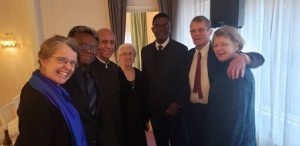
Faces of family members and friends after Prof Beckman’s burial in Sweden last Dec
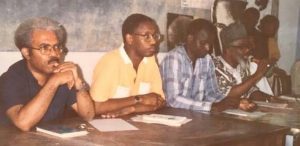
Faces from ABU, Zaria of those days
How far this totality will stretch the discussion towards a renaissance of Bjorn Beckman’s creativity with Marxism is the question now. The Swedish political economist of Marxist persuasion was a major figure in the furious ferment that defined the Ahmadu Bello University, Zaria intellectual landscape throughout the 1980s. But many would argue that he established his scholarly authority not because he was a Marxist but through a gift for provocative framing of the different contradictions of the Nigerian political economy in such a manner as to remain fascinating among the studentry beyond ABU, Zaria, a stature enhanced by his activist orientation and democratic attitude to all. His essays such as “Marxism and Underdevelopment: A Critique of Ake” or “Whose State?: State and Capitalist Development in Nigeria” or “Trade Unions and the Politics of Crisis in South Africa and Nigeria Compared” typify the framing competence under reference. They are always about mapping what has become problematic about capitalism or the state or whichever sphere he took, not regurgitating ancient quotations that have, contextually, nothing to do with the issue at stake.
The feeling is pervasive that Marxism itself has, like everything else in contemporary Nigeria, suffered high degree of impoverishment. Uncomplicated Marxism that reckons with none of the huge debates even within Marxism, not to talk of the metatheoretical claims and counter-claims in the post Cold War have rendered Marxism a non-issue in Nigerian politics. Implied in such critical observations is the notion that the current level of Marxism in Nigeria is incapable of producing the classics of critical (Marxist) scholarship as in “Recent Patterns of Accumulation in Nigeria”; “Middlemen, Consultants, Contractors and the Solutions to the Current Economic Crisis”; “Overcoming Some Basic Misconceptions of the Nigerian Economic Crisis”; “Oil and Class Contradictions in the December 1983 Coup” and so on.
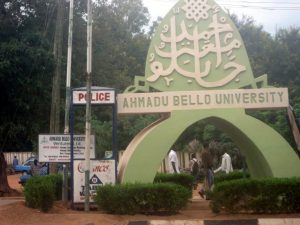
ABU, Zaria where the hugely successful 1983 Marx and Africa Conference took place
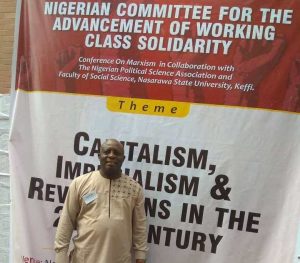
Significant but not too successful 2018 effort
In 2018, a Marx Conference was basically a flop as the theory – practice nexus appeared to be too wide to bridge. Universities still offer ‘Theory and Practice of Marxism’ but it is doubtful if anything is happening in those classes other than students cramming to pass the course so as to graduate. This claim is very easy to test.
Of course, Beckman had his critics and received a lot of flaks, both within and outside ABU, Zaria. Outside Zaria, the most dramatic of that must be the disagreement with Prof Claude Ake who was the doyen of political economy at the University of Portharcourt. In a recent essay, Prof Yusuf Bangura, another warrior in the battlespace called ABU, Zaria then, told the story of Ake-Beckman encounter in full, perhaps for the first time, (https://intervention.ng/18256/).
Whatever happens, it promises to be a mixture of nostalgia, revolutionary sentiments, very revealing and entertaining stories, some home truths and perhaps some more ideological fisticuffs. However it goes, the ability to organise a memoriam for a Bjorn Beckman involving diverse speakers and actors in spite of everything speaks to a transformative resilience that could one day enable a statement about Nigeria from Nigeria.




























